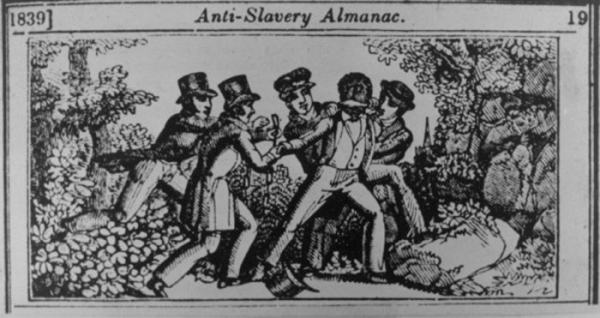Those are not words I use lightly. Yet hard though it might be to believe, most historians nowadays accept that among the direct precursors to the modern police force were the slave-catching patrols of the old South. That doesn't mean that other events had no influence. It does mean that we need to understand the patrols to understand where we are now.
In the late 18th and early 19th centuries, most Northern communities used a night-watch system, adopted from England, to keep order. The night watchman rarely made a circuit of the town, but stayed at his post, prepared to be summoned when a crime occurred. Where sheriffs existed, they were, in the 18th century, essentially tax collectors.
The slave patrols, by contrast, did what the name suggests -- they patrolled. Although their organization varied from place to place, in most of the South the members of the patrol were recruited from, and had special responsibility for, a particular small geographic area known as a "beat" – thus the origin of our contemporary term.
The slave patrols, the dreaded "paterollers," are remembered best for tracking down runaways and ferreting out potential uprisings, but many scholars think they had a more important day-to-day role. Those held in bondage in the South were seen as the greatest potential source of crime, including theft, assault, and sabotage of agricultural equipment. There was a steady traffic in pilferage, valuables being sold to free black railroad workers who would carry them North and resell them. By the reckoning of the slavocracy, the anti-crime patrols were being sent exactly where they were needed. Small surprise, then, that free white citizens were required to join the patrols if called. Given recent events, it's a poignant historical irony that in the 1830s, the slave patrol of Charleston, South Carolina, had more members than any city police force in the North.
Despite legal codes purporting to control them, the patrollers were feared and reviled for their cruelty. A freedman named Lewis Garrard Clarke wrote that the patrols were "the tooth and tongue of serpents … the fool's cap of baboons ... the scum of stagnant pools ... the meanest, and lowest, and worst of all creation."
And yet, for all their horrors, the slave patrols provided the template for the policing in its contemporary sense. Richmond, Virginia, created a full-time police force only after Gabriel Prosser led a slave uprising in 1800. Other cities followed suit. Yet three decades later, newspapers in Charleston complained that the police were too few to control the restive black population, and demanded an increase in the number of ... patrollers.
Read complete article at Bloomberg View




 Imagine going to the polls on Election Day and discovering that your ballot could be collected and reviewed by the
Imagine going to the polls on Election Day and discovering that your ballot could be collected and reviewed by the ACLU Blueprints Offer Vision to Cut US Incarceration Rate in Half by Prioritizing 'People Over Prisons'
ACLU Blueprints Offer Vision to Cut US Incarceration Rate in Half by Prioritizing 'People Over Prisons'  "These disasters drag into the light exactly who is already being thrown away," notes Naomi Klein
"These disasters drag into the light exactly who is already being thrown away," notes Naomi Klein  How about some good news? Kansas Democratic Representative advances bill for Native Peoples.
How about some good news? Kansas Democratic Representative advances bill for Native Peoples.  What mattered was that he showed up — that he put himself in front of the people whose opinions on
What mattered was that he showed up — that he put himself in front of the people whose opinions on On a night of Democratic victories, one of the most significant wins came in Virginia, where the party held onto
On a night of Democratic victories, one of the most significant wins came in Virginia, where the party held onto A seismic political battle that could send shockwaves all the way to the White House was launched last week in
A seismic political battle that could send shockwaves all the way to the White House was launched last week in In an interview with Reuters conducted a month after he took office, Donald Trump asserted that the U.S. had “fallen
In an interview with Reuters conducted a month after he took office, Donald Trump asserted that the U.S. had “fallen Attorney General Jeff Sessions overturned the sweeping criminal charging policy of former attorney general Eric H. Holder Jr. and directed
Attorney General Jeff Sessions overturned the sweeping criminal charging policy of former attorney general Eric H. Holder Jr. and directed